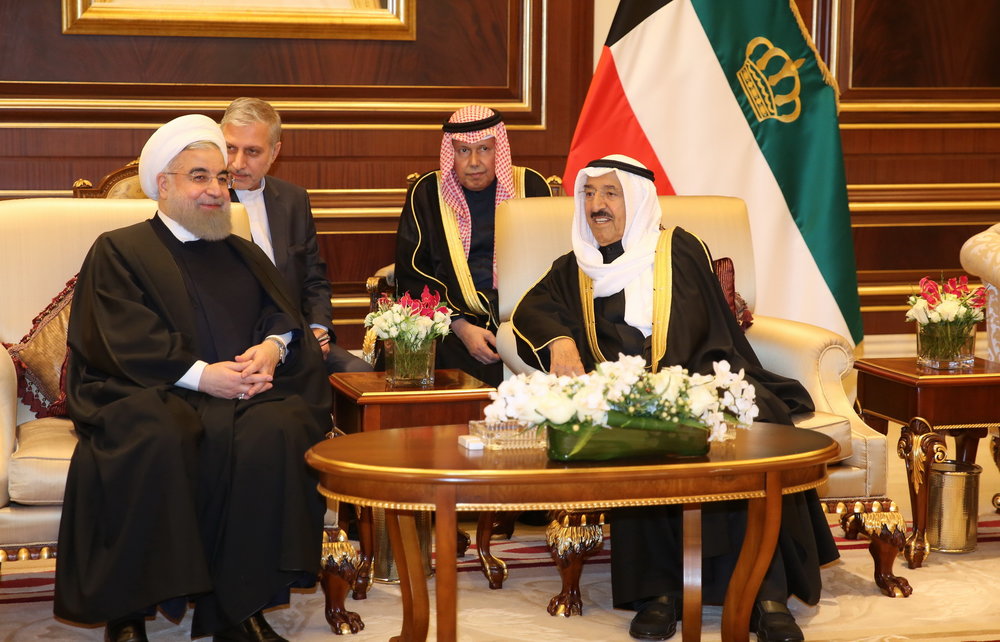Rouhani on Persian Gulf tour, seeking better Arab ties

TEHRAN – Iranian President Hassan Rouhani took a one-day trip on Wednesday to Oman and Kuwait, seeking a détente with the Arab world, strained over the past few years.
Welcomed by Sultan Qaboos bin Said al Said in Muscat, Rouhani highlighted age-old bilateral relationship of the two countries, hailing them as “close and brotherly.”
The two sides also laid emphasis on business ties with a focus on banking.
Rouhani also referred to Iran’s military capability as a heavyweight for the whole region rather than a threat, as certain regional states and outside powers claim.
“Iran’s military power is purely for defense and an asset for the region’s security,” he stressed, embracing any effort to act at a wider scope with regional states.
“The Islamic Republic of Iran has helped regional countries in case they have faced problems including a fight against terrorism,” Rouhani noted, responding indirectly to accusations that Tehran is fueling sectarian conflicts in the Middle East.
Kuwaiti emir welcomes Rouhani
Upon arrival in Kuwait late on Wednesday, Rouhani was warmly welcomed by Kuwait’s Emir Sabah Al-Ahmad Al-Jaber Al-Sabah, along with a large group of officials, including the crown prince, foreign minister, cabinet, and lesser officials, at the Kuwait International Airport.
The two leaders then sat for talks at the emir’s palace.
Before leaving Tehran for Oman early Wednesday, Rouhani said Iran’s foreign policy is based on good neighborliness and protection of security in the Persian Gulf region.
“The Islamic Republic of Iran has never sought aggression against other countries, interference in their affairs, or imposing political or religious beliefs,” he explained.
Rouhani also said Tehran welcomes a proposal submitted by Kuwait to resolve misunderstandings between Iran and the Arab states bordering the Persian Gulf, saying all differences can be settled through dialogue.
The president also said that security should be provided by the regional countries without foreign interference.
He added, “The Islamic Republic of Iran seeks to expand relations with neighboring countries and boost stability and security in the region.”
Some countries and media outlets have tried to link the differences between Shiite Iran and certain Sunni Arab countries over the crises in Syria and Yemen to religious differences.
Rouhani said the division between Shia and Sunni, Iranophobia, and Islamophobia are caused by foreigners.
Elsewhere, the president said Iran has always had good relations with Oman and Kuwait.
There are many capacities in the three countries for expanding their ties, he added.

What is in the backdrop?
The trips come weeks after Kuwaiti Foreign Minister Sheikh Sabah al-Khalid al-Hamad Al Sabah traveled to Tehran on January 25, bearing a letter from the country’s emir on behalf of six Persian Gulf littoral states seeking to fix ties with Tehran.
Days following the meeting, a spokesman with Iran’s Foreign Ministry told a press conference in Tehran that the Iranian government was mulling a response to the reconciliation overture.
Also, last Wednesday Kuwaiti Deputy Foreign Minister Khaled al-Jarallah welcomed remarks by Iranian Foreign Minister Mohammad Javad Zarif comments that Iran country was ready for dialogue with the (P)GCC, saying, "It's what we're looking for."
"Rouhani's regional initiative to accept invitation of leaders of Oman and Kuwait signals the need for Islamic friendship and restoration of regional ties," Hamid Aboutalebi, the Iranian president's deputy chief of staff, tweeted on Tuesday.
Less hostility between Iran and Arab states will make inroads into the beleaguered Middle East.
Efforts to restore peace to the region have failed so far.
One main cause, people familiar with the issue say, is the political standoff between Tehran and Riyadh over a list of issues.
Relations between the two have deteriorated over the past few years.
Riyadh and some other Arab countries claim that Iran interferes in Arab countries by fueling sectarianism to expand its sphere of influence in the sensitive region. Tehran denies any interference in the region.
Tensions between Saudi Arabia and Iran have particularly reached levels unseen since the 1980s, where most Arab countries took side with Iraq after it waged a war against Iran, which lasted for nearly eight years.
Irrespective of ideological discrepancies, Tehran and Saudi Arabia do not agree on the situation in Syria.
Backing President Bashar al-Assad unfailingly, Iran opposes demands by Saudi Arabia and other Arab states that Assad should step down.
Prior to the recent Astana talks on the Syrian conflict, Iranian Defense Minister Hossein Dehqan said that Riyadh should be barred from taking part in the negotiations because of its stance on a Syria without al-Assad.
On Saturday, Iran’s parliamentary National Security and Foreign Policy Committee declared that it was to review Tehran’s policies toward Saudi Arabia.
As archrivals, Tehran and Riyadh have had no political relations for a little more than a year after Riyadh summoned its diplomats from Tehran in the aftermath of attacks on its diplomatic missions in Iran by angry mobs.
The storming came after Riyadh's execution of Sheikh Nimr al-Nimr, an outspoken opponent of the Saudi kingdom.
On Jan. 17, Iranian President Hassan Rouhani said at least 10 countries had offered mediation to lessen the escalating feud.
SOURCE : TEHRANTIMES